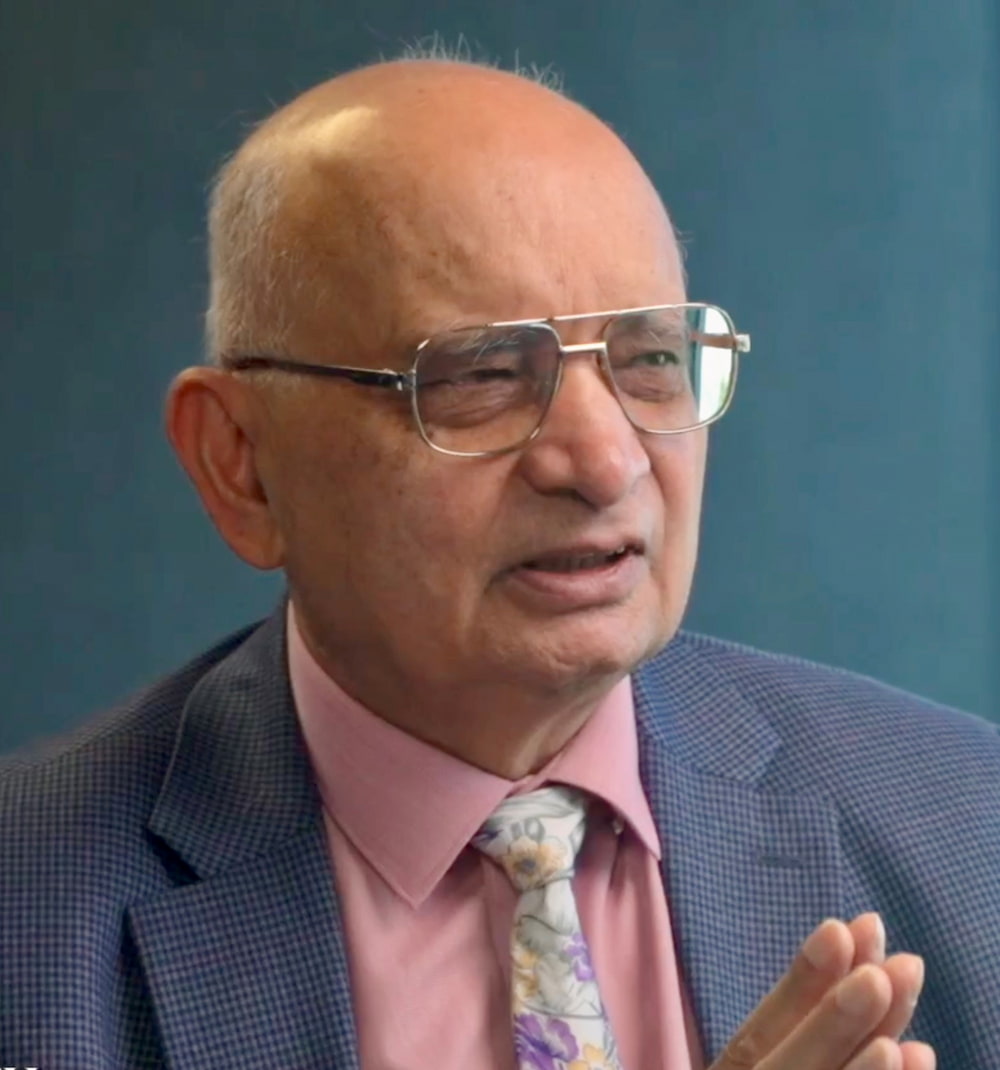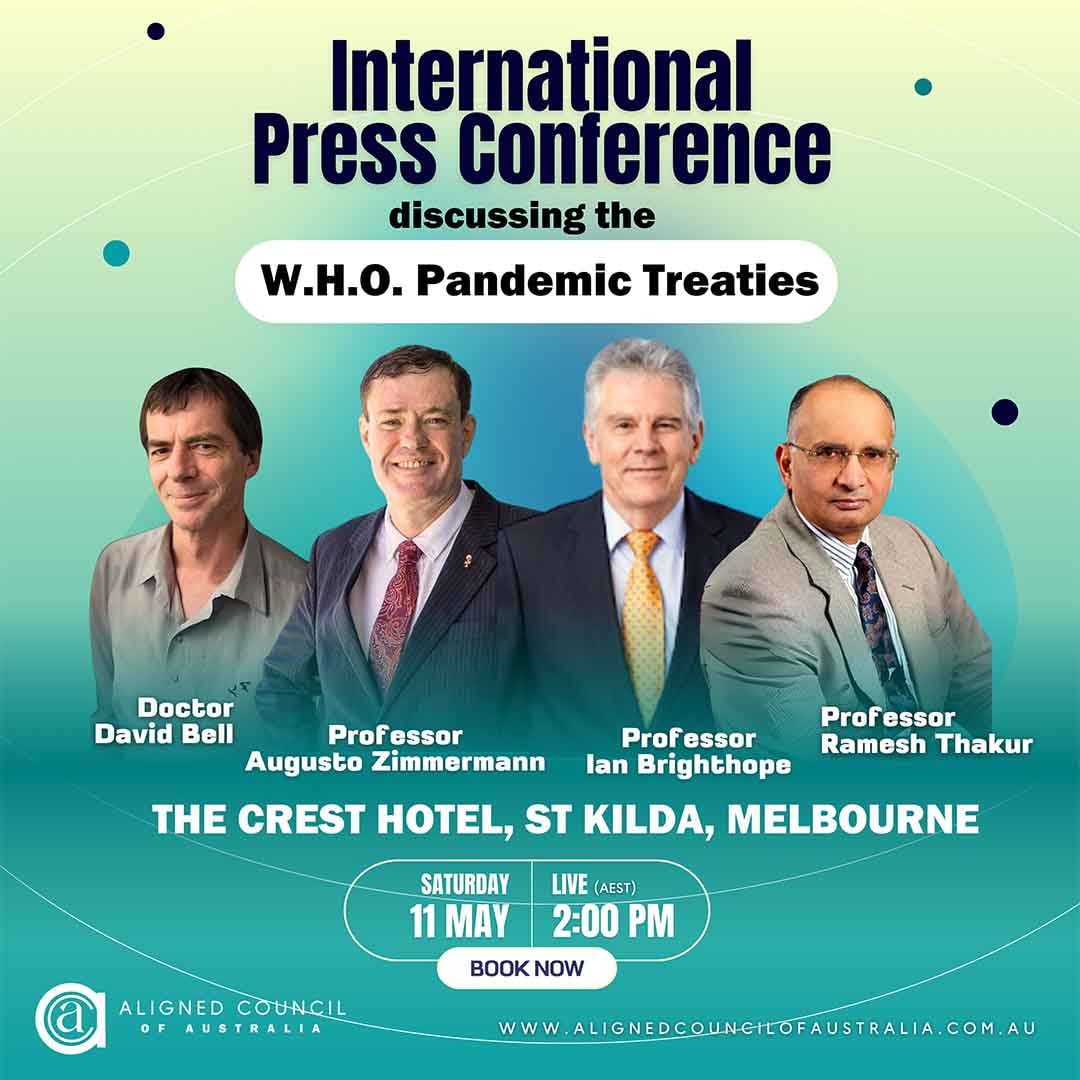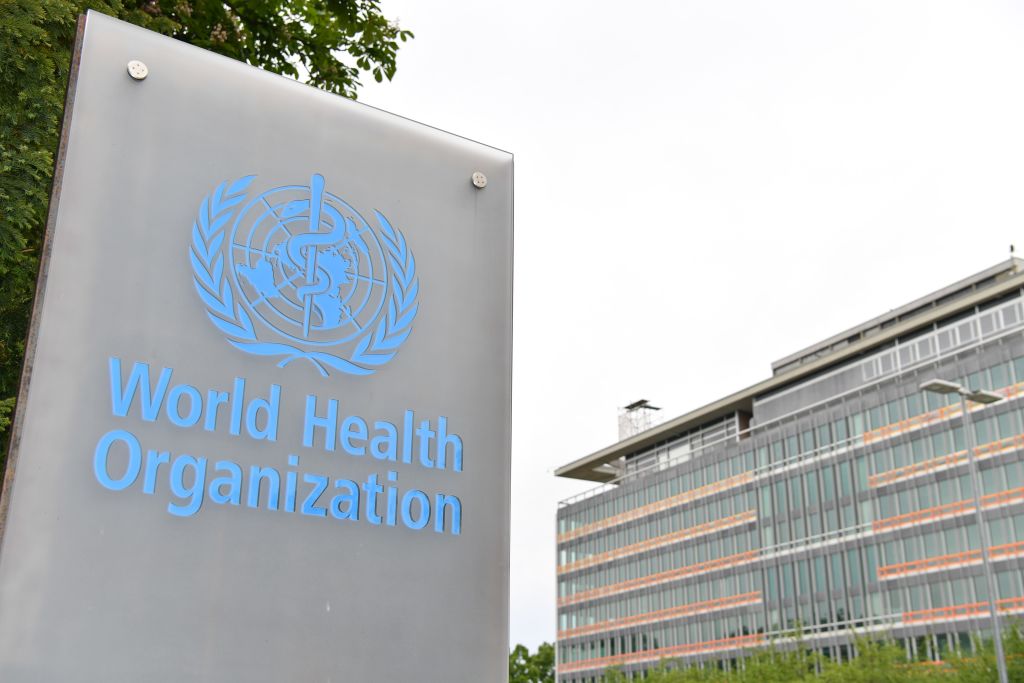Most Australians are likely unaware of the proposed new World Health Organization’s (WHO) Pandemic Treaty or the 2005 International Health Regulations (IHR) Amendments which are currently being discussed in Geneva and will be voted upon, on their behalf, in the week of 27 May this year.
The newly formed Aligned Council of Australia (ACA) has launched Action Week from 6 May until 12 May, including an international press conference in Melbourne on Saturday 11 May.
Their aim is to inform Australians of the WHO’s proposed pandemic treaty reforms and how, they conclude, these changes can significantly impact Australians’ daily lives and health.
The WHO is the health arm of the United Nations and is a Member State-led organisation made up of 194 countries, including Australia. Australia participates in the WHO decision-making processes and provides funding to WHO to assist countries to improve health outcomes. The WHO has had no legal authority to force countries to accept any of its recommendations, which include more recently, how countries managed the COVID-19 pandemic.
However, the proposed pandemic treaty reforms include extensive amendments to the 2005 International Health Regulations (IHR) and a new pandemic treaty.
Ramesh Thakur, Emeritus Professor in the Crawford School of Public Policy, The Australian National University, and former Assistant Secretary-General of the United Nations, is gravely concerned that if these reforms are not rejected in their current form before 27 May this year, “The two sets of changes to the architecture of global health governance will effectively change the WHO from a technical advisory organisation offering recommendations, into a supranational public health authority telling governments what to do.”

Thakur bases his views on proposed changes such as Article 49.5 of the IHR’s which suggests that the Director General of WHO, currently Tedros Adhanom Gehbreyesus, should not only be able to personally choose members of an Emergency Committee tasked with making recommendations in the event of a public health crisis, but that the Director General would have the final say. ‘The views of the Emergency Committee shall be forwarded to the Director-General for consideration. The Director-General shall make the final determination on these matters.’
It is worth noting that in 2022, WHO Director General Gehbreyesus, overruled a WHO Emergency Committee who voted 9-6 against the Monkey Pox virus being declared a Public Health Emergency of International Concern (PHEIC). Gehbreyesus issued a statement on 23 July declaring Monkey Pox a PHEIC. One which was later downgraded on 10 May, 2023.
Giving one individual or organisation this kind of power concerns Thakur.
“The proposed changes to the International Health Regulations and the new Pandemic Agreement will empower WHO to inflict incompetence all over again based on the demonstrably flawed judgment of the WHO chief, only with greatly strengthened powers over the rights of states to respond on their own best judgment. Remember, he declared a global health emergency in 2022 after five deaths and this was lifted less than a year later after just 140 deaths in the world,” he says.
Arguably, were the proposed amendments and new pandemic treaty in place during the Monkey Pox PHEIC, Australia may have seen the reintroduction of public health measures experienced during the COVID-19 pandemic, and more. Ultimately against the advice of the WHO Emergency Committee and without apparent significant reason.
Article 42 of the proposed IHR amendments includes that the WHO Member States (which includes Australia) would be bound to do what the WHO advises:
‘Health measures taken pursuant to these Regulations shall be initiated and completed without delay and applied in a transparent and non-discriminatory manner. State Parties shall take all practicable measures, in accordance with national laws, to engage with non-State actors operating in their respective jurisdictions with a view to achieving compliance with, and implementation of, health measures taken pursuant to these Regulations.’
According to the ACA, this will be ensured by a newly appointed ‘National IHR Authority’, which is an entity designated or established by member countries at the national level to coordinate the implementation of these Regulations within the territory of the member countries, such as Australia (Articles 1 and 4 IHR).
What kinds of health measures might Australia be bound to implement?
The WHO directives or health measures listed in the proposed IHR amendments (Article 18, IHR) may include:
- proof of medical examination and any laboratory analysis;
- medical examinations;
- proof of vaccination or other prophylaxis;
- vaccination or other prophylaxis;
- place suspect persons under public health observation;
- implement quarantine or other health measures for suspect persons;
- implement isolation and treatment where necessary of affected persons;
- implement tracing of contacts of suspect or affected persons;
- refuse entry of suspect and affected persons;
- refuse entry of unaffected persons to affected areas;
- implement exit screening and/or restrictions on persons from affected areas.
In other words, if Australia accepts these amendments, the Aligned Council of Australia, which is an expert and advocacy collective and represents over 37 organisations and 1.32 million Australians, warns that the Australian Government will be obliged, because of the treaty they agreed to, to follow the recommendations of WHO.
This is not because WHO has ‘power’ over Australia, but because part of agreeing to the amendments means adjusting Australian law to comply with what WHO recommends.
Indeed the Australian Department of Health and Aged Care website states:
Signing a new international instrument and IHR changes may create new international legal obligations for Australia. However, this doesn’t automatically change Australian law – only the Australian Parliament can do this.
Any legally binding pandemic instrument and IHR changes must go through parliamentary processes before Australia can take binding action. This includes consideration by the Joint Standing Committee on Treaties (JSCOT).
Katie Ashby-Koppens, civil litigator and human rights lawyer and member of the ACA, adds;
Australia already has in its legislation that it can give effect to the recommendations made to the Health Minister by the World Health Organization under the 2005 International Health Regulations (eg Biosecurity Act 2015, s477 and 478). Very little amendment would be required to revise those provisions to include the new pandemic reforms.
In an article in The Australian on 3 May, Ashley Bloomfield, co-chair of the WGIHR (Working Group International Health Regulations) and former New Zealand director-general of health, disagreed with Thakur’s claims, and what he describes as general ‘misconceptions’ regarding countries giving up their decision making powers in the event of a public health emergency should they agree to the pandemic treaty reforms:
As a former senior UN official with extensive global diplomacy experience, Dr Thakur would know that every word of any binding agreement or treaty is meticulously scrutinised during its negotiation by the member states of the relevant UN body, in this case the WHO. He would know that no single member state is going to concede sovereignty through either the IHR review or INB processes, let alone the entire 194 members.
Professor Thakur responded that to the contrary, member states (countries), certainly have and can give up their decision-making rights on issues, when they agree to certain treaties:
“For centuries, countries had the absolute right to wage wars of aggression and defence as an acknowledged and accepted attribute of sovereignty. By adopting the United Nations Charter in 1945, they gave up the right to wage aggressive wars. I am very glad they did so. Just because the surrender of this aspect of sovereignty was voluntary, it doesn’t mean there was no surrender of sovereignty. Similarly, by signing the Nuclear Non-proliferation Treaty (NPT), Australia surrendered its sovereign right to make or get the nuclear bomb. Again, I am very glad it did so,” he says.
“Similarly, simply because states must voluntarily sign the new WHO accords doesn’t mean they will not be ceding sovereignty once the accords are adopted.
“Every single ‘legally binding’ requirement will mean a transfer of effective decision-making power on health issues to the WHO. That is a curtailment of state sovereignty, and it is disingenuous of WHO officials to deny it.
“Besides, the Covid years showed how easy it was for national ‘experts’ to seize power from the politicians. In the new and amended texts, the globalist technocrats are busy trying to make this permanent and irreversible.”
Professor Augusto Zimmermann, Professor of Law, Head of Law, Chair of the Research Committee, and co-Chair of the Academic Council at Sheridan Institute of Higher Education, Perth has also weighed in with his concerns that the powers extended to the WHO via these pandemic reforms, could spell disaster for a range of Australian freedoms:
“This would have disastrous consequences for fundamental human rights… Australia still has the power to reject these amendments that would allow WHO’’s Director-General to arbitrarily impose pandemic lockdowns, vaccine mandates, and other highly oppressive measures. Above all, if the use of these policies becomes a reality, the world as we know it will cease to exist. We either stand for our basic rights and freedoms or risk losing everything come May 2024.”
What’s the rush?
The pandemic treaty reforms are due to be voted upon by Australian unidentified delegates, and the other 193 WHO Member States, in the week of 27 May 2024 at the 77th World Health Assembly. However, the reforms are still being negotiated.
Under its own WHO rules however, the amendments to the International Health Regulations (IHR’s) were supposed to be delivered in January 2024, so that the 194 member countries could review them and the new pandemic treaty, with sufficient time, before voting.
They have not provided them yet.
In an open letter co-authored by Australian Dr David Bell who is a former medical officer and scientist at the WHO and Programme Head for malaria and febrile diseases at the Foundation for Innovative New Diagnostics (FIND) in Geneva, Dr Bell and colleagues say that the WHO is breaking its own rules:

‘The adoption of any amendments of the IHR at the 77th WHA can no longer be achieved in a lawful manner. Currently, the WGIHR keeps negotiating the draft amendments, with the aim to finalise the package of proposed amendments during its 8th meeting scheduled for the 22nd – 26th April that is then to be presented to the 77th WHA. This modus operandi is unlawful.
It violates Article 55(2) IHR which sets out the procedure to be followed for amending the IHR, in that, ‘The text of any proposed amendment shall be communicated to all States Parties by the Director-General at least four months before the Health Assembly at which it is proposed for consideration.’
The open letter to the WHO also challenges apparent looming new pandemic threats:
Whilst some have argued that urgency in developing new pandemic management instruments is justified by a rising risk and burden of such infectious disease outbreaks, this has recently been demonstrated to be a markedly exaggerated claim. The evidence bases on which the WHO have relied, and partner agencies including the World Bank and G20, demonstrate that the risk of naturally derived outbreaks is not currently increasing, and overall burden is probably declining. This suggests that current mechanisms are indeed working relatively effectively, and changes must be viewed carefully, without undue urgency, in the light of the heterogeneity of threat and competing public health priorities across WHO Member States.
Why should Australians reject the amendments and new pandemic treaty? Isn’t the WHO a trustworthy organisation?
Dr Bell says that due to the WHO’s changed funding arrangements over the years it is no longer the independent agency it once was and is heavily influenced by major donors, both private and governmental.
“The WHO once based its priorities on assessment of disease burden and country need. It has now become a public-private partnership with most of its work directly specified by its funders, who include pharmaceutical companies and their private investors. These are the same entities who gained financially from the COVID-19 response and will do so through the proposed Pandemic Agreement and IHR amendments,” he says.
In their summary document, the ACA reports that on top of the $22 million in assessed contributions that Australia has already paid to the WHO for the year 2022-2023 as a member state, Senator Penny Wong announced in September 2023 a pledge by the Australian Government of a further $100 million:
“At the UN High-Level Meeting on Pandemic Prevention, Preparedness and Response, I announced the Australian Government will provide $75 million in voluntary core funding over five years to the WHO, and a further $25 million for the WHO’s Health Emergencies Programme,” she said.
Under the new reforms however, Australians will have to cough up a lot more annually.
The ACA says that the WHO, under Article 20 of the new Pandemic Treaty, can potentially increase Australian contributions by an unknown amount as ‘the WHO will be able to dictate significant financial contributions by individual member states to support developing nations.’
The ACA estimates the cost to Member States for the WHO to be Pandemic Ready is ≥5% of the member states’ national health budgets. ‘For Australia that’s an estimated $5.29B per year, just to be pandemic ready. Enough to pay for 53,000 senior nurses for a year or pay for 212,000 hip replacements,’ they say.
Would Australia be on its own in seeking more time to consider the treaty reforms? Or rejecting them outright?
It would seem not. Other countries have already chosen to reject some or all, of the proposed changes at this time.
These include the Dutch House of Representatives in the Netherlands who are calling for a postponement and the new New Zealand Parliament who have already rejected some of the amendments.
The New Zealand Government will also conduct a national interest analysis before agreeing to confirm any pandemic treaty reforms and has sought the views of the New Zealand people via a national survey.
And in the United States last week, in an uncommon display of unity, all Republican Senators signed a letter to President Joe Biden, in which they conclude:
In light of the high stakes for our country and our constitutional duty, we call upon you to 1) withdraw your administration’s support for the current IHR amendments and pandemic treaty negotiations, 2) shift your administration’s focus to comprehensive WHO reforms that address its persistent failures, without expanding its authority and 3) should you ignore these calls, submit any pandemic related agreement to the Senate for its advice and consent.
This has been further reinforced on 8 May when 22 US Attorney Generals signed another letter to President Biden insisting that he reject the WHO reforms. And on the same day Britain announced it will also refuse to sign the World Health Organisation’s pandemic treaty:
“We will only support the adoption of the accord and accept it on behalf of the UK, if it is firmly in the UK national interest and respects national sovereignty” a UK Department of Health and Social Care spokesperson said.
These include the Dutch House of Representatives in the Netherlands who are calling for a postponement and the new New Zealand Parliament who have already rejected some of the amendments.
The New Zealand Government will also conduct a national interest analysis before agreeing to confirm any pandemic treaty reforms and has sought the views of the New Zealand people via a national survey.
And in the United States last week, in an uncommon display of unity, all Republican Senators signed a letter to President Joe Biden, in which they conclude:
In light of the high stakes for our country and our constitutional duty, we call upon you to 1) withdraw your administration’s support for the current IHR amendments and pandemic treaty negotiations, 2) shift your administration’s focus to comprehensive WHO reforms that address its persistent failures, without expanding its authority and 3) should you ignore these calls, submit any pandemic related agreement to the Senate for its advice and consent.
It is likely that most Australians remain unaware of both the role of the WHO in their lives, and of the proposed changes. Whilst the Department of Health and Ageing issued an invitation to the public last year between August and September, to submit any concerns they may have had; this was not done via a media release or advertising campaign in a way accessible to all Australians.
A spokesperson for the Department of Health and Aged Care confirmed that it was done through their LinkedIn and Twitter accounts only, and that it is not possible to either count or read the responses individually:
The Department of Health and Aged Care invited responses to the ‘Preparing for, and responding to, future pandemics and other international health emergencies’ public consultation through relevant Departmental social media accounts (LinkedIn and Twitter). At the time of submission, respondents were made aware that the Department would release an analysis of responses provided. Respondents were also advised that responses received would not be attributed to individuals or organisations.
A summary of those submissions which were received however, can be found here, and further information from the Australian Government regarding Australians pandemic preparedness can be found on the Australian Government Department of Health and Aged Care website.
It is also unclear to what extent Australia’s Federal politicians and bureaucrats are invested in the nuances of the proposed changes.
Last week, during an interview with Peta Credlin however, LNP Senator and member of the Federal Joint Standing Committee on Treaties, (JSCOT) Matt Canavan spoke of his concerns about giving the WHO more power at this time, when in his opinion, the WHO failed dismally in its management of COVID – 19:
Now with this process set in train, we are effectively looking at giving the body that discredited itself perhaps more than any other, apart from the Chinese CCP, during this crisis, the WHO… we are going to give the WHO more power. The WHO pretty much got everything wrong about the pandemic. They got the lockdowns wrong…they also recommended against closing our international borders and wanted us to keep taking flights from Wuhan in late January 2020…Why would we give this discredited body, its conflicted given how much money it takes from China, why would we give it more power? That’s what’s on the cards here.
When asked to respond to the concerns raised by Dr Bell, the ACA and Professors Thakur and Zimmermann, particularly in relation to Australia handing over its decision-making powers, a spokesperson for the Australian Government provided the following response
“The COVID-19 pandemic demonstrated we need strengthened capacities to respond to future pandemics. To achieve this, Member States of the World Health Organization are negotiating a new pandemic agreement and amendments to the International Health Regulations (2005). Australia is actively engaging in these negotiations to promote our national interests.”
Ashby-Koppens is not impressed. She feels that the Australian government is avoiding providing detailed responses to genuine concerns. “The response from the government is the same template response that all government departments and elected officials have been citing,” she says.
Who is the ACA and what can you do to learn more?
The ACA reports that it is an initiative of aligned every day Australians including lawyers, doctors, accountants, professors, emergency services personnel, community leaders, business owners, and individuals created to bring awareness to the ‘…deeply concerning proposals being put forward by the World Health Organization (WHO)’ in the name of the next ‘pandemic’.
Joining Emeritus Professor Ramesh Thakur as members of the ACA are other experts including Professor Gigi Foster, Professor Ian Brighthope, Professor Paul Frijters, Professor James Allan, Ms Katie Ashby-Koppens and numerous medical and other professionals.
Ashby- Koppens invites Australians to read a summary of the proposed changes here to be more informed of the extent to which things in Australia could change as early as this year, should another Public Health Emergency be declared.
The ACA are seeking to give Australians access to detailed and clear information, and to help them have their say, via various activities during their Action Week.
These include:
- Australia’s Greatest Letterbox Drop when thousands of registered volunteers will continue to deliver millions of flyers to Australian households.
- Run billboards across the ACT, as per those already run in WA, VIC, NSW and SA
- Run inclusive community education and activation programs
- Equip Aussies to contact their Federal Members of Parliament and Senators with their concerns via the MySayMatters platform and National Electoral Representative initiative
- Host the international press conference in Melbourne on Saturday 11 May 2-5 pm. In person and online tickets are available via the ACA website.
The Council was formed in February 2024 in response to WHO’s two pandemic reforms and they invite Australians to join the growing number of people around the world, who are not satisfied with what is currently being proposed in Geneva.
Professor Ian Brighthope for the ACA says:
Tens of thousands of protestors are gathering around the world to oppose the two pandemic treaty reforms. We urge Australians to inform themselves immediately via the ACA website at www.alignedcouncilofaustralia.com.au , to join our action week as they see fit, and book a virtual or online ticket to the press conference on May 11. We hope that Australians will then communicate their opposition to these reforms to our federal politicians, before May 27.



